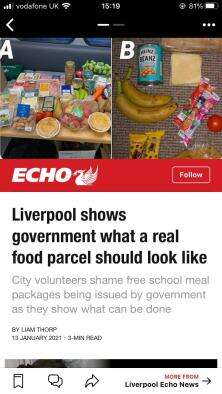
Meta is turning off Facebook Instant Articles after seven years as the platform continues to draw away from supporting news publishers.
But the mood in the industry does not appear to be one of sadness or surprise, especially for those who have diversified beyond a reliance on Facebook traffic.
The Instant Articles format, which is optional for publishers, allows news links to open in a quicker-to-load, mobile-friendly format within the Facebook app rather than readers having to wait for an external website to load.
Meta claims 37,000 Facebook pages currently use them, that Instant Article pages load 4.9 times quicker than mobile web pages, and that Facebook users open 52% more articles if they are in that format.
The switch-off, which will come in mid-April, follows reports that Meta plans to stop paying US publishers to include their content in the Facebook News tab. UK newsbrands have not yet been told the same, but their multi-year contracts still have more time to run.
Meta has said users want to see less news and political content on their feeds and that they are spending more time consuming video content, particularly in short-form formats like Reels and Stories.
[Read more: Why news publishers are positive about Instagram’s shift to video]
A Meta spokesperson said: “Currently less than 3% of what people around the world see in Facebook’s feed are posts with links to news articles. And as we said earlier this year, as a business it doesn’t make sense to over-invest in areas that don’t align with user preferences.”
After April, article links will send users to publishers’ own websites rather than keeping them within the Facebook app as Instant Articles when publishers and users had both opted in.
This means news titles will monetise their Facebook traffic by their website programmatic or in-house advertising rather than the current options: in Instant Articles, publishers can either sell all their own advertising and keep the revenue, or allow Facebook to fill the spaces and keep an estimated 70% of the income.
Publishers will still separately be able to monetise video content on Facebook using in-stream ads.
[The news industry’s $1bn question: Is Meta about to unfriend journalism?]
Publishers’ history with Facebook Instant Articles
Instant Articles launched with several initial partners in the US in 2015 and in the UK the following year.
But by 2017 some backlash had begun. The Guardian pulled out due to what then-chief executive David Pemsel described as “woeful” financial returns. The publisher decided it would be more worthwhile to send readers through to its own site, where it could benefit from both its own advertising and by encouraging readers to contribute financially.
A Guardian News and Media spokesperson said at the time its “primary objective is to bring audiences to the trusted environment of the Guardian to support building deeper relationships with our readers…”
The New York Times also stopped using Instant Articles in 2017 after deciding monetisation and subscription sign-ups were both better when users clicked through to its own site. Others with similar viewpoints, as reported by Digiday, included Hearst, Forbes and Quartz.

Others, however, were more keen on the format. Zach Leonard, The Independent’s chief executive who was its digital chief at the time, told Press Gazette in 2017 Instant Articles were an “important form of advertising sales”.
And in January last year Reach, the UK’s largest commercial news publisher, revealed the results of a “business-defining” experiment at flagship regional the Liverpool Echo that showed Instant Articles were being seen by almost a third more readers than stories not using the mobile-friendly format.
Reach also benefited from newsletter subscribers signing up using a “call to action” button option added to Instant Articles in 2019.
The journey away from Instant Articles follows publishers increasingly ditching Accelerated Mobile Pages (AMP) on Google in the past year after the search giant made it no longer compulsory to use the similarly fast-loading format to rank in its most competitive spots.
Reaction: most ‘will not be shedding a tear’
Reach’s head of social media and engagement Dan Russell told Press Gazette that the majority of the publisher’s Facebook traffic stopped being Instant Articles earlier this year after the platform changed its privacy policy so people who opted out of tracking were no longer shown the format.
Some 48% of Reach’s Facebook traffic is now Instant Articles. Russell said: “Would we like to keep Instant Articles? Maybe. But to be completely honest, it will have petered out. It feels like they’re jumping before they’re pushed.”
Russell said there had been pros and cons to the format: publishers had to accept a revenue split, but they benefited from ranking better in Facebook feeds due to faster open speed and better bounce rates.
Over time, however, Reach and other websites have done a lot of work on their own website experiences and load speeds and the Instant Articles technology has aged.
They are also concentrating more on video, with Facebook video revenue at Reach up 582% year-on-year in September.
Russell knew the switch-off was coming, although not precisely when or how long it would take, after being told Meta “won’t support a service where the vast majority of people don’t use it”. He said: “I think you can understand the reasoning behind that.” He added he felt “it would be wrong to criticise Facebook” because they are having “tricky times” of their own – Meta’s stock price is down 60% since the start of the year.
[Read more: UK media minister says government is ‘very mindful’ of big tech threats over news payments]
Russell said: “I feel that we have diversified our revenue stream so much in the last two years that we’re a lot better positioned than if we hadn’t.”
Although he expected some publishers with a higher reliance on Instant Articles revenue and traffic to their written content may struggle more, he added: “I almost guarantee they’ll come out with something better than they had before because Instant Articles is quite old now and with change comes opportunity and I guarantee that most publishers will see it that way.”
Social media consultant Matt Navarra, who was head of social at tech publisher The Next Web when Instant Articles launched but went freelance in 2018, pointed out that the “social media landscape has shifted significantly” since the launch of Instant Articles, including the arrival of Tiktok and the popularity of short-form video formats as well as much-improved browsing speeds.
“These changes have eroded the core value and purpose of Instant Articles for both news publishers and Facebook,” Navarra told Press Gazette, adding their end was “therefore unsurprising”.
“News publishers have always had a volatile relationship with Facebook,” he went on. “Publishers were never very happy about ceding so much control and audience data to Facebook in order to use Instant Articles. And for an uncomfortably long period of time after they first launched, they were buggy, prone to issues, and often hard to get Facebook’s help to resolve problems.
“The proprietary format just gave news publishers another thing that sucked up their development team’s time managing, and offered only limited upsides. Facebook was known for massively over-hyping new features or tools it pestered news publishers to adopt or invest resources in during this period. And they nearly always produced inconsistent or disappointing results.
“However, Facebook’s role in content distribution on the social web was/is so large, most publishers could not easily dismiss implementation of things like Instant Articles. The potential reach of content on Facebook is just too huge to ignore. Some publishers will have benefited from the Ad Network integrations Instant Articles offered, but I’d imagine the loss will easily be muted by the gains made switching back to direct site traffic.
“I suspect most publishers will not be shedding a tear over news of Instant Articles’ demise. Whilst it may create some additional work for them to remove Instant Article integrations, the upside of direct traffic to their sites and one less platform-specific format will be good news.”
Richard Reeves, managing director at the Association of Online Publishers, agreed the announcement will not have been a “great surprise” to publishers “with the importance of Instant Articles having been very much in decline over the last year”.
“Although the format has been a source of discovery for some, publishers have largely migrated away more recently to focus their resources on other platforms, for example Instagram, which have established themselves as more effective vehicles to support audience development strategies,” he said.
Picture: Kenzo Tribouillard/AFP via Getty Images
Email pged@pressgazette.co.uk to point out mistakes, provide story tips or send in a letter for publication on our "Letters Page" blog
